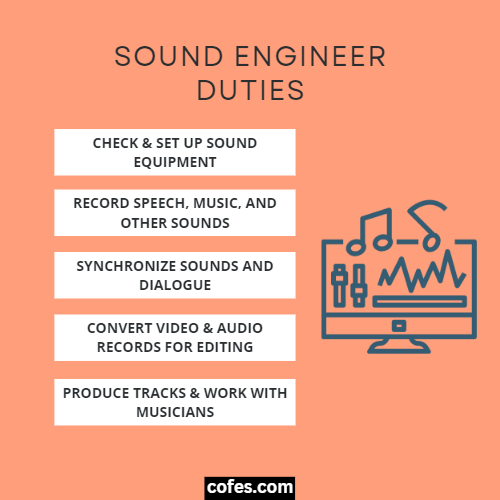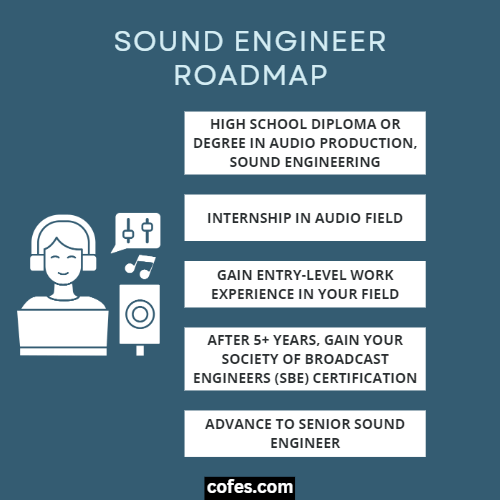Sound Engineers are responsible for all of the technical aspects of both managing and recording sound.
Sound engineers make sure everything you hear is crisp, clean, and flows correctly.
They may engineer sounds for a live band, national convention, feature film, or video game.
If you love music and enjoy fast-paced, challenging projects, a Sound Engineer may be the career path for you.
Sound Engineer Information
| Official Job Title: | Sound Engineer |
| Average Salary: | $52,252 |
| Stress Level: | High |
| Work/ Life: | High |
| Job Satisfaction: | Above Average |
| Career Advancement: | Below Average |
Sound Engineer Job Description
What Is A Sound Engineer?
A Sound Engineer is the one responsible for putting together all the technical aspects of recorded sound.
Whether they are reproducing tracks, mixing audio, maintaining sound equipment like microphones and amps, or recording sound effects, a Sound Engineer has a hand in every part of a project’s sound systems.
What Does A Sound Engineer Do On A Daily Basis?
The daily duties of a Sound Engineer depend on their chosen field.
There are several fields for a Sound Engineer to choose from, including the following:
- Music Production
- Location and Film Post Production
- Band Recording
- Live Sound
- Game Audio
Duties can include equipment and sound checks, recording ambient sound, producing tracks, and working with musicians to brainstorm the best ways to feature their vocals.

Responsibilities, Duties, And Roles Of A Sound Engineer
The responsibilities, duties, and roles in each field are as follows:
- Music Production
- To be successful in music production, you must have a high music IQ.
- Since you may be required to work with many types of musicians, you should be comfortable with many music genres.
- Tasks can include mixing audio and working with musicians to find the best sound to match their ideas.
- Location and Film Post Production
- In this field, you are on set with a film crew.
- Daily tasks include making sure the sound is clear without the microphone becoming visible in the shot, working with the director to analyze sound quality, and adding sound effects and background noises (ambient) to complete the production.
- Band Recordings
- You are responsible for checking that the instruments are tuned before a session and having a sharp ear for out-of-tune musicians.
- You will also need to ensure that the microphone and equipment are functioning correctly.
- Live Sound
- Working with live sound means you may find yourself at a variety of different locations.
- Sound Engineers are responsible for the equipment and production at music festivals, conventions, sports broadcasts, and talk shows.
- Game Audio
- Game Audio is the most challenging field to enter, as it is a tight-knit community that can be wary of outsiders.
- Once in, however, you must be comfortable with all game engines, coding, and sound design.
- A Game Audio Sound Engineer is also responsible for location recording, music producing, and band recording and must be highly detail-oriented.
Sound Engineer Salary
Average Salary
The average salary of a Sound Engineer is $52,252.
Starting Salary
The average entry-level salary of a Sound Engineer is $45,573.
Senior Salary
The average senior salary of a Sound Engineer is $87,509.
How To Become A Sound Engineer
The Entry Level: Certification, Training, And Degree
To enter into the field of sound engineering, most companies look for a degree in audio production, sound engineering, or a similar field.
Still, some may only require a high school diploma.
There is no official entry-level certification or training, but interning in the audio field is incredibly helpful while building up a portfolio that you can use to apply for a higher-level position.
Other Skill Sets, Requirements, And Qualifications
Once you have been working in the audio field for five years, you are eligible for the Society Of Broadcast Engineers or SBE certification.
It is not required for career advancement but is highly recommended, and most production companies will want their Sound Engineers to have it.
To receive the certification, you must complete an exam that delves deeply into audio and technical categories.
Once you pass, it lasts for five years, at which time you will have to re-certify.
How Long Does It Take To Become A Sound Engineer?
Generally, it takes 2-5 years, but the length of time it takes to become a Sound Engineer varies, depending on whether you get a degree or technical training.
Is It Hard To Become A Sound Engineer?
Becoming a Sound Engineer requires detailed knowledge of music and how music production works.
If you can learn quickly and understand the technical aspects of the job, becoming a Sound Engineer is not particularly hard.
However, if you struggle in those areas, it can be harder to succeed in the field.
Sound Engineer Career Paths
The Sound Engineer Roadmap

The roadmap to becoming a Sound Engineer is as follows:
- Complete Training
- Obtain a high school diploma or a degree in audio production, sound engineering, or a similar field.
- You may also find courses at technical schools if you aren’t able to pursue a degree.
- Start an Internship
- Finding an internship in the audio field will give you the practical experience you need, as well as help you develop your portfolio.
- Find A Job In The Field
- After completing an internship, you are ready to find a job working in your chosen field.
- Complete Certification
- Once you have worked for five years, you can get your Society Of Broadcast Engineers (SBE) certification.
- Completing this will allow you to advance into a senior Sound Engineer.
Projections For Growth In Sound Engineer Jobs
The projected growth for Sound Engineer jobs is good at an expected rate of 10% for the next ten years.
This growth is considered faster than average.
In Summary: Is Sound Engineer A Good Career?
If you have a love for music and a keen understanding of production technology, then being a Sound Engineer may be a good career for you.
It is fast-paced and highly stressful, and you must put the time in to gain trust and build a portfolio.
However, if you’re willing to put in the work, you will find being a Sound Engineer can be very satisfying and exciting.
Working Conditions
Can A Sound Engineer Work From Home?
There may be aspects of the job you can perform at home if you have the correct equipment, but most of the work you do will be in a recording studio or on-site venue.
How Many Hours Does A Sound Engineer Work?
You will work more than a forty-hour week the majority of the time as a Sound Engineer.
Your schedule will be very fluid if you are at a location, working with a recording artist or live talent.
Can A Sound Engineer Work Part-Time?
Yes, it is possible to work part-time, especially when you are just starting.
As time goes on and you have more clients, part-time work will become rarer.
What Are The Average Vacation Days Of A Sound Engineer?
Average vacation days for a Sound Engineer are eleven days after one year of employment, fifteen days after five years, and eighteen days after ten years of employment.
Alternative Careers & Similar Jobs to a Sound Engineer
- Computer Engineer
- Product Engineer
- Film Editor
- Multimedia Artist
- Camera Operator
- Screenwriter
- Content Creator
- Web Designer
- Communications Director
- Supervisor
- Engineering Technician
Sound Engineer Resume Tips
When writing a resume, you want to make sure you highlight all the work activities you can complete.
Make sure you list all of your qualifications, even if they don’t seem important to you, since you never know what a company is looking for specifically.
Also include all degrees, certifications, training, and internships.
Sound Engineer Interview Questions
Q1: Are you able to multi-task effectively?
Why this works: Asking this question during an interview can give insight into the candidate’s ability to perform all aspects of the job without getting overwhelmed or leaving anything undone.
Q2: Which genre of music are you most comfortable working with?
Why it works: If the candidate is only comfortable working with specific genres of music, they may not be able to perform their job thoroughly.
Look for answers like “I’m comfortable working with all genres of music.”
Jobs Related To Sound Engineer
If you are interested in jobs similar to a Sound Engineer, these are a few options:
- Forensic Audio
- Audio Engineer
- Record Producer
- Audio Technician
- Sound Designer
For HR Manager: Tips For Hiring A Sound Engineer
Key Characteristics To Look For In A Sound Engineer
Good characteristics to look for in a Sound Engineer include creativity, technical savvy, a keen ear for tone, being career-oriented, and good problem-solving skills.
Minimum Level Of Education And Experience
The minimum level of education should be either a degree or a technical certificate.
Having at least two years of experience working as an intern in the field is highly recommended, but you may reconsider if the candidate’s portfolio is impressive.
